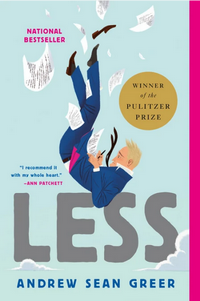 Less
Less
DETAILS: Publisher: Back Bay Books Publication Date: May 21, 2018 Format: Paperback Length: 261 pg. Read Date: November 4-7, 2022

I am probably going to say an awful lot of seemingly contradictory things here, so the tweet-length version of this post is: Less is full of gorgeous prose but the character and story never interested me one whit.
What’s Less About?
From the back of the book:
Who says you can’t run away from your problems?
You are a failed novelist about to turn fifty. A wedding invitation arrives in the mail: your boyfriend of the past nine years is engaged to someone else. You can’t say yes–it would be too awkward. And you can’t say no–it would look like defeat. On your desk are a series of invitations to half-baked literary events around the world.
QUESTION: How do you arrange to skip town?
ANSWER: You accept them all.
What would possibly go wrong?
Thus begins an around-the-world-in-eighty-days fantasia that will take the novelist Arthur Less to Mexico, Italy, Germany, Morocco, India, and Japan and put thousands of miles between him and the plight he refuses to face.
Why Didn’t I Just DNF This?
Three reasons, none of which hold any kind of water, but seemed to carry the day.
-
- I hate to DNF books, holding out hope that they’ll win me over eventually. Enough have that I can’t shake the habit. (as I explained here)
- I really hate to DNF books I spent money on. I also refuse to DNF books that I receive from an author or as an ARC. So basically, I’ve learned via this bullet point that I’ll only DNF library books (with incredibly rare exceptions)
- I finally took this off my TBR shelf because of a reading challenge, and it’d feel strange to cross this off my to-do list without having read the whole thing.
But I came close frequently over the first hundred pages or so, but then I figured while I wasn’t going to have a good time, there were enough gems along the way, that it was worth the bother. Also, there was one thing I was mildly curious about (although I forgot about it until the answer was revealed).
The Metanarrative at Work
This may get too close to a spoiler for the truly phobic, although I’ll be as vague as I can be, so feel free to skip to the next heading.
Throughout the book, Arthur hears some hard things about his work. Someone that he meets along his travels is very frank about the problems with his novels as a whole—although she adored one of them—and their criticisms, he hears a lot about what is wrong with the novel his publisher had just declined to buy from him.
Their words stick with him and at some point, he accepts their argument (at least about his new book) and dives in to rework it in light of those ideas. In his view, at least, saving the novel and maybe producing something his publisher would want—perhaps something that would find success both with the critics and the market.
It could be said—It shouldn’t (probably), but it could—that Greer took an early draft of Less and saw (or was shown) the same things in it that Arthur saw in his new novel, and then took the same approach that his character did, reshaping the work until it resulted in what I just read. I’m sure Greer just came up with this device for Arthur (perhaps started from it) and wrote for it.
Instead, what we really have is the Author coming alongside the reader and telling us “Here’s how to read this book. All those things along the way up to this point? This is what I’ve been doing with them.” I can appreciate why he’d do that, I think it worked pretty well for this book—and I generally like it when authors do that (although I usually think it’s unnecessary and often self-indulgent). I don’t know that the book needed that done, but I think it helped.
It didn’t change my opinion of the novel much, if at all, but it did make me a bit more certain about Greer’s intention and themes.
So, what did I think about Less?
I started with this point, and I’ll wrap up with it here at the end—the prose is gorgeous. If you can go more than three pages without admiring a sentence or paragraph (if not more), it’s because you weren’t paying attention. I can see why readers and critics who connected with the material raved about this and threw awards at it.
But I never connected to Arthur. It’s not his lifestyle, it’s not his indolence, his pretentiousness, his…cluelessness (it’s not the right word, but it’s close enough). I’ve read and enjoyed characters like that before (and will again). It’s just Arthur and his story that didn’t work for me. I found his strategy for dealing with the wedding foolish and cowardly. I didn’t find the humor in the whole less-fluent-than-he-realizes-in-German schtick.* I’m not so sure I ever bought into whatever self-discovery he made. I really think the ending—and what it suggests is about to happen—undercut whatever Less had achieved through his travels.
* On the other hand, DeLillo’s Jack Gladney being unable to read or speak German absolutely works for me. I am not anti-satire involving Teutonic languages. I just thought I should make that clear.
Because I appreciated the writing so much, I can’t bring myself to give this the 2.5/2 stars I’d have otherwise given this. Read other people raving about the book, read the book if you’re curious, but I really can’t recommend it.

This post contains an affiliate link. If you purchase from it, I will get a small commission at no additional cost to you. As always, the opinions expressed are my own.
![]()



1 Pingback